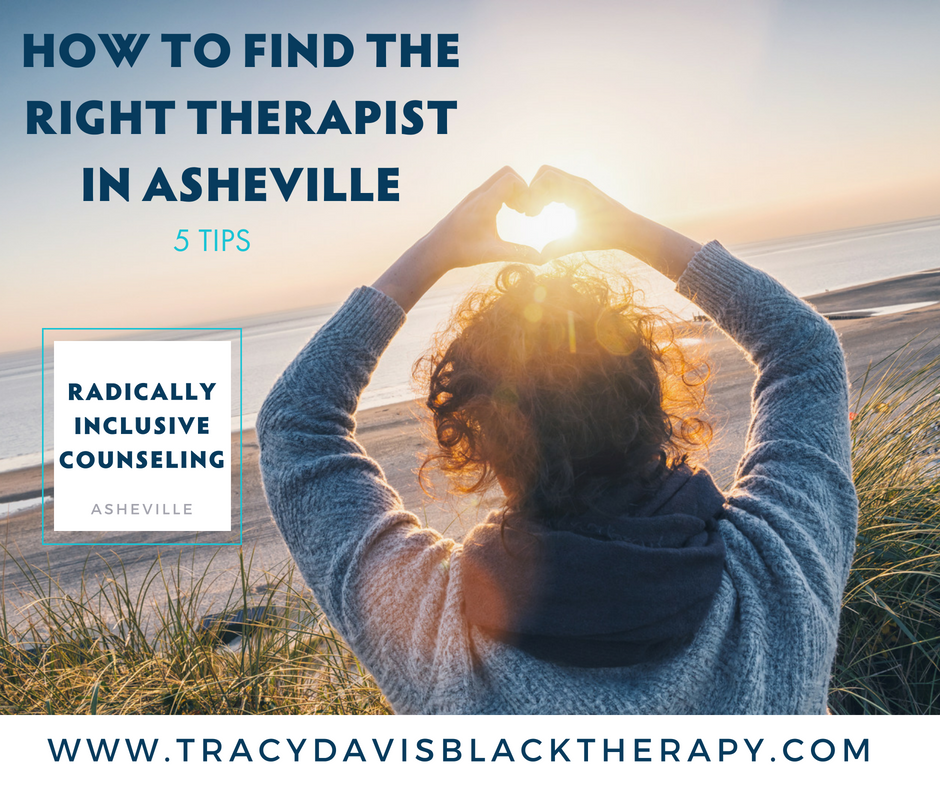5 Tips for Finding the Right Therapist in Asheville
You have been in therapy before, but you felt that the therapist didn’t get you. Maybe you felt like things weren't getting better or that the therapist just sat there and nodded. You stopped going to therapy, and now you’re back in the same spot that sent you looking for help just like the last time. You have found a few therapists in Asheville that seemed friendly enough. All of them talk about offering a "free consultation." But, what should you ask? What should you say? What is appropriate?
How to find a therapist who is right for you?
You don't have an endless budget for therapy. You don't want someone that you vent to. You need some relief. You hear a lot of talk about finding a therapist who is a "good fit," but what does that actually mean?
Here are 5 tips for talking with a potential therapist in Asheville:
1. Listen to your instincts. Pay attention to how you feel and to your gut instincts when you are talking to the person. Often times we override what our gut says about these things. There is a lot of information there - listen to it. Does it feel natural to talk to this therapist? Is there ease in the conversation and can you imagine building trust to share what is really going on for you? And most importantly, do they respond in a way that makes you feel understood? If there is something that feels off during the consultation, I encourage you to bring it up. Notice the potential therapist’s response as well as your reaction. There is a lot of information in this exchange that helps to inform you to know if it feels like a good fit.
2. Find out if they have the skills to help. Ask them what they specialize in and how they work. You want someone whose training and experience lines up with what you are needing. All therapists can't treat ALL symptoms and I would be wary of people who say that they can. The mental health field is so broad and it is next to impossible to stay on top of the most effective treatments for everything. Don't be shy to ask what their skills and qualifications are.
3. Services that fit you. Let's face it; therapists spew a lot of psychobabble. If a prospective therapist happens to use words that you don't know what they mean - feel free to stop them and ask them to explain it. When you ask a therapist about how they help people or how they work, make sure that the therapist can explain and that it resonates with you. There are some therapies that are skills based, others that are talking centered, and others that are more experiential. Everyone has a preference for the type of therapy that they want. When a therapist explains the way that they work it should feel like, "ah, that sounds good."
4. Feeling safe is a priority. Finding a therapist who understands you and your struggles and is fundamentally accepting of you is crucial for EVERYBODY. However, this is particularly important if you are if you are a person of color, LGBTQIA+ identified, transgender/gender non-conforming/ non-binary, poly, or differently abled person - it is essential to find a therapist who gets you and understands your experience in the world. The last thing that you need, when you go see a therapist, is to have your identity or life experiences invalidated. Ask them about their experiences working with POC, sexual minorities, gender variance, non-traditional lifestyles, etc. Can they talk about these things with ease and confidence? You need a therapist who can unpack and grapple with the impacts of having oppressed identities and will see you for who you are.
5. Define how progress in therapy will be measured. One of the things that I hear often about why people quit therapy is that they did not understand what was happening in therapy sessions or that they couldn't tell if they were getting better. Progress in therapy can be a daunting task. Often times, things can get worse before they get better and this kind of situation can be confusing. Ask the potential therapist to orient you to the therapy process and how it works. Will the therapist help you to define your goals for therapy as well as engage you in a process to make sure that these changes are happening?
I hope this helps you find the right therapist in Asheville. If you are still feeling stuck, feel free to call me at (828) 484-4992 for a free 15-minute phone consultation. I’d be happy to hear about what is happening and help direct you to the right person. If you are looking for help with trauma, anxiety, or stress, you can read more about how I can help here.

